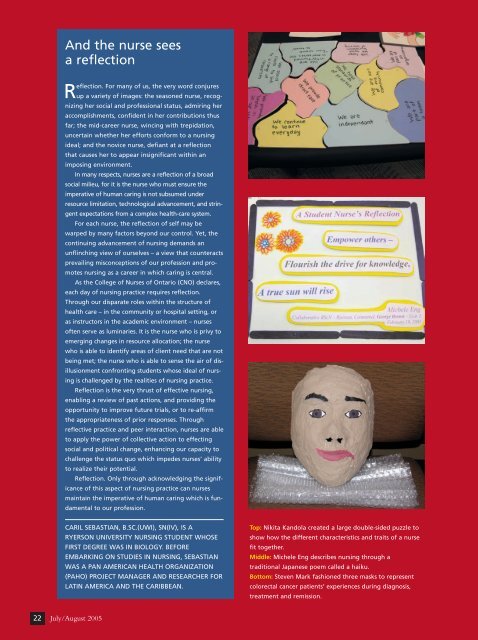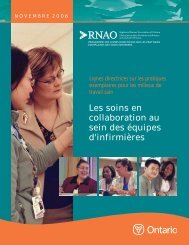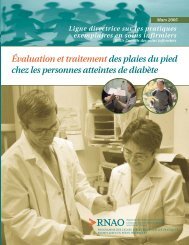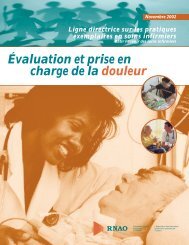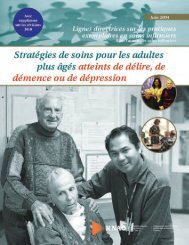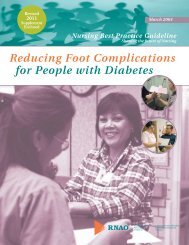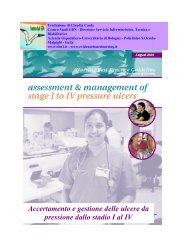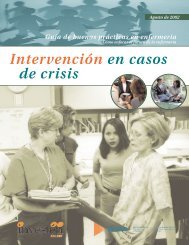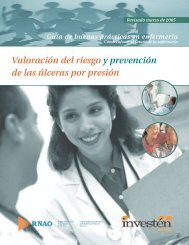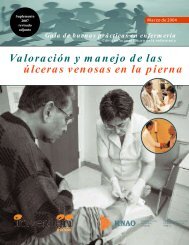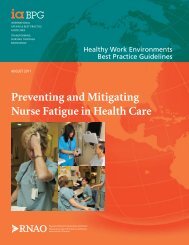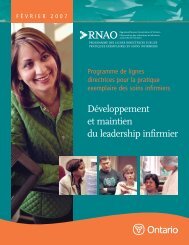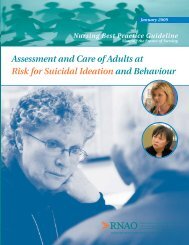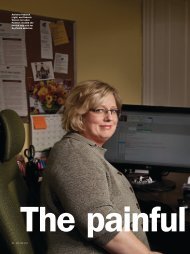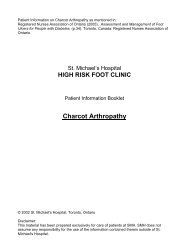lhins: bringing it all back home - Registered Nurses' Association of ...
lhins: bringing it all back home - Registered Nurses' Association of ...
lhins: bringing it all back home - Registered Nurses' Association of ...
You also want an ePaper? Increase the reach of your titles
YUMPU automatically turns print PDFs into web optimized ePapers that Google loves.
And the nurse sees<br />
a reflection<br />
Reflection. For many <strong>of</strong> us, the very word conjures<br />
up a variety <strong>of</strong> images: the seasoned nurse, recognizing<br />
her social and pr<strong>of</strong>essional status, admiring her<br />
accomplishments, confident in her contributions thus<br />
far; the mid-career nurse, wincing w<strong>it</strong>h trepidation,<br />
uncertain whether her efforts conform to a nursing<br />
ideal; and the novice nurse, defiant at a reflection<br />
that causes her to appear insignificant w<strong>it</strong>hin an<br />
imposing environment.<br />
In many respects, nurses are a reflection <strong>of</strong> a broad<br />
social milieu, for <strong>it</strong> is the nurse who must ensure the<br />
imperative <strong>of</strong> human caring is not subsumed under<br />
resource lim<strong>it</strong>ation, technological advancement, and stringent<br />
expectations from a complex health-care system.<br />
For each nurse, the reflection <strong>of</strong> self may be<br />
warped by many factors beyond our control. Yet, the<br />
continuing advancement <strong>of</strong> nursing demands an<br />
unflinching view <strong>of</strong> ourselves – a view that counteracts<br />
prevailing misconceptions <strong>of</strong> our pr<strong>of</strong>ession and promotes<br />
nursing as a career in which caring is central.<br />
As the College <strong>of</strong> Nurses <strong>of</strong> Ontario (CNO) declares,<br />
each day <strong>of</strong> nursing practice requires reflection.<br />
Through our disparate roles w<strong>it</strong>hin the structure <strong>of</strong><br />
health care – in the commun<strong>it</strong>y or hosp<strong>it</strong>al setting, or<br />
as instructors in the academic environment – nurses<br />
<strong>of</strong>ten serve as luminaries. It is the nurse who is privy to<br />
emerging changes in resource <strong>all</strong>ocation; the nurse<br />
who is able to identify areas <strong>of</strong> client need that are not<br />
being met; the nurse who is able to sense the air <strong>of</strong> disillusionment<br />
confronting students whose ideal <strong>of</strong> nursing<br />
is ch<strong>all</strong>enged by the real<strong>it</strong>ies <strong>of</strong> nursing practice.<br />
Reflection is the very thrust <strong>of</strong> effective nursing,<br />
enabling a review <strong>of</strong> past actions, and providing the<br />
opportun<strong>it</strong>y to improve future trials, or to re-affirm<br />
the appropriateness <strong>of</strong> prior responses. Through<br />
reflective practice and peer interaction, nurses are able<br />
to apply the power <strong>of</strong> collective action to effecting<br />
social and pol<strong>it</strong>ical change, enhancing our capac<strong>it</strong>y to<br />
ch<strong>all</strong>enge the status quo which impedes nurses’ abil<strong>it</strong>y<br />
to realize their potential.<br />
Reflection. Only through acknowledging the significance<br />
<strong>of</strong> this aspect <strong>of</strong> nursing practice can nurses<br />
maintain the imperative <strong>of</strong> human caring which is fundamental<br />
to our pr<strong>of</strong>ession.<br />
CARIL SEBASTIAN, B.SC.(UWI), SN(IV), IS A<br />
RYERSON UNIVERSITY NURSING STUDENT WHOSE<br />
FIRST DEGREE WAS IN BIOLOGY. BEFORE<br />
EMBARKING ON STUDIES IN NURSING, SEBASTIAN<br />
WAS A PAN AMERICAN HEALTH ORGANIZATION<br />
(PAHO) PROJECT MANAGER AND RESEARCHER FOR<br />
LATIN AMERICA AND THE CARIBBEAN.<br />
22 July/August 2005<br />
Top: Nik<strong>it</strong>a Kandola created a large double-sided puzzle to<br />
show how the different characteristics and tra<strong>it</strong>s <strong>of</strong> a nurse<br />
f<strong>it</strong> together.<br />
Middle: Michele Eng describes nursing through a<br />
trad<strong>it</strong>ional Japanese poem c<strong>all</strong>ed a haiku.<br />
Bottom: Steven Mark fashioned three masks to represent<br />
colorectal cancer patients’ experiences during diagnosis,<br />
treatment and remission.


